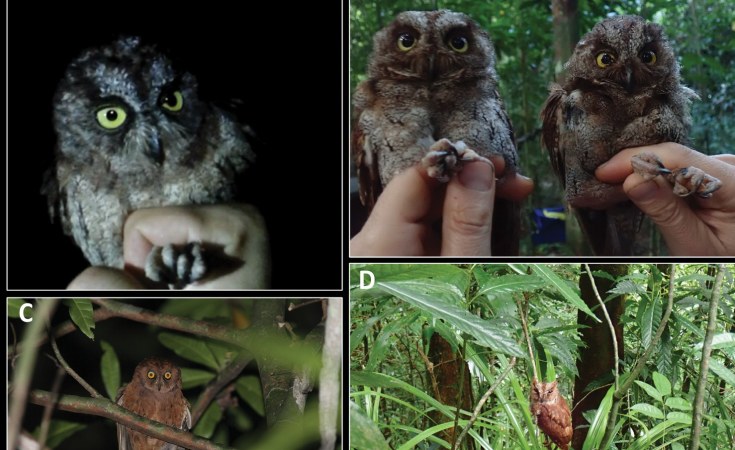As part of an international team of scientists we have confirmed a new species of owl after decades of speculation that it exists on Príncipe Island, part of the Democratic Republic of São Tomé and Príncipe in central Africa.
The existence of the owl was first confirmed in 2016 by a photo taken by Philippe Verbelen. However, testimonies from local people suggest they've suspected that the owl existed since as long ago as 1928 - it was just rarely spotted.
Now, we've described the owl in the open-access journal ZooKeys based on multiple lines of evidence. These included morphology, plumage colour and pattern, vocalisations and genetics. Because these characteristics are different from the other scops-owls, we showed that this owl is in fact a new species.
The bird is now officially known as the Príncipe scops-owl, or Otus bikegila.
Hidden owls
Otus is the generic name given to a group of small owls sharing a common history, commonly called scops-owls. They are found across Eurasia and Africa, and include such widespread species as the Eurasian scops-owl (Otus scops) and the African scops-owl (Otus senegalensis).
The species epithet bikegila was chosen in homage of Ceciliano do Bom Jesus, nicknamed Bikegila - a former parrot breeder from Príncipe Island and now a ranger in Príncipe's nature reserves. The discovery of the Príncipe scops-owl was only possible thanks to the local knowledge shared by Bikegila and by his unflinching efforts to solve the long-term mystery of whether the owl existed. As such, the name is also meant as an acknowledgement to local field assistants, all over the world, who often play a major role in the discovery of new species and sites for science.
Otus bikegila has a unique call - a short "tuu" note, repeated at a fast rate of about one note per second, reminiscent of insect calls. It is often emitted in duets, almost as soon as the night has fallen. This call was one of the main clues that led to its discovery.
Otus bikegila's unique call. Author provided6.21 MB (download) Even though the Príncipe scops-owl has only now been described by science, genetic data indicates that it descends from the very first scops-owl species that colonised the Gulf of Guinea archipelago. Although it may seem odd for a bird species to remain undiscovered for science for so long on such a small island, this is by no means an isolated case when it comes to owls. For example, the Anjouan scops-owl was rediscovered in 1992, 106 years after its last observation, on Anjouan Island (also known as Ndzuani) in the Comoro Archipelago. The Flores scops-owl was rediscovered in 1994 - 98 years after it was last reportedly sighted.
Príncipe, land of birds
The Príncipe scops-owl is the eighth known species of bird endemic to Príncipe - meaning that they occur nowhere else on Earth. This unusually high level of bird endemism on an island of only 139 km2 highlights the global conservation importance of Príncipe. Additionally, Príncipe shares another three endemic species with the neighbouring islands of São Tomé and Annobón.
We surveyed the entire Príncipe Island to determine the distribution and population size of the new species. Results, published in the journal Bird Conservation International, show that this new scops-owl is found only in the remaining old-growth native forest of Príncipe. These are now confined to the uninhabited southern part of the island. There, it occupies an area of about 15 km2, apparently due to a preference for lower elevations. In this small area (about four times the size of Central Park), the densities of the owl are relatively high, with the population estimated at around 1,000-1,500 individuals.
Nevertheless, because all individuals of the species occur in this single and very small location (of which a part will be affected in the near future by the construction of a small hydro-electric dam), we have proposed that the species should be classified as "critically endangered" - the highest threat level on the International Union for Conservation of Nature's Red List. The organisation is still to evaluate this recommendation.
Critically endangered species
The discovery of a new species that is immediately evaluated as highly threatened illustrates all too well the current biodiversity predicament. On a positive note, the area of occurrence of the Príncipe scops-owl is fully included within the Príncipe Obo Natural Park, which will hopefully help secure its protection.
Monitoring the population will be essential to get more precise estimates of its size and follow its trends. Surveying nocturnal species in remote and difficult terrain is riddled with many logistics and funding challenges. To overcome these difficulties, we designed and successfully tested a survey protocol which uses automatic recording units placed around their habitat. Artificial intelligence will be used to retrieve the owl calls from the thousands of hours of recordings that will be produced.
Birds are the most studied animal group so the discovery of a new bird species in the 21st century is really something to celebrate. But it also underscores the importance of field-based explorations aiming to find what may soon no longer exist. It also shows how curiosity-driven endeavours are more likely to succeed when coupled with local ecological knowledge, the participation of keen amateur naturalists and persistence.


